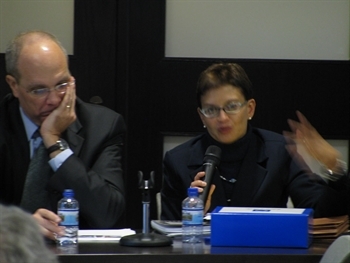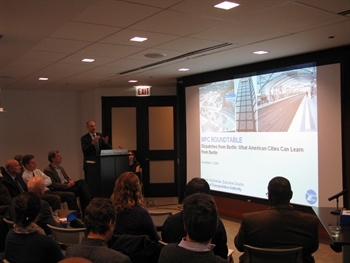At a time when the Chicago region is studying high speed rail, bus rapid transit, and congestion pricing, it is essential that we look closely at the successes and challenges of other transportation systems around the world, and learn from their experiences. On Nov. 3, MPC hosted a panel of three distinguished speakers to share best practices from Berlin, Germany’s transportation network, and discuss the ways in which these methods could be applied in the United States. The roundtable, “Dispatches from Berlin: What American Cities Can Learn,” highlighted the challenges of a once divided city and how officials were able to integrate East and West Berlin into a multimodal transportation system.

Therese McMillan and Steve Schlickman discuss innovative policies in Berlin
Therese McMillan, deputy administrator of the Federal Transit Authority, discussed her department’s work to improve the livability of existing neighborhoods through upgraded transit. To do this, she argued, we must follow the German’s lead and prioritize investment in maintaining our current infrastructure, as well as ensure that any new infrastructure provides multimodal access in an environmentally sustainable way. McMillan emphasized the need for inter-disciplinary collaboration across federal government agencies and highlighted the Sustainable Communities Partnership between the Dept. of Transportation (DOT), Housing and Urban Development (HUD), and Environmental Protection Agency (EPA) – the first ever partnership of its kind – as an example of interagency coordination and comprehensive planning.
Next, Stephen Schlickman, executive director of the Regional Transit Authority (RTA), addressed two particular innovations of Berlin’s transportation system. First, he spoke of the Berlin Hauptbahnhof station, whose centrality, multi-modality, and energy efficiency make it a model for all transportation centers in the U.S. He also mentioned the VBB’s (essentially Berlin’s RTA) inventive fare collection method, which uses cell phones to wirelessly and efficiently pay transit fares. Schlickman reported the RTA is currently working to bring a universal fare card to its users. Metra has already made some headway in this endeavor when it recently began accepting payment via credit card. In addition, Schlickman was pleased to announce the recent purchase of more than 400 new CTA cars from the Bombardier Transit Corporation, with innovative features that include longitudinal aisle seating, which will provide greater access for passengers transporting bicycles, luggage, or strollers, and added security cameras to increase passenger safety.

Benet Haller, director of urban design and planning at the Chicago Dept. of Land Use and Zoning, discussed Chicago’s Central Area Action plan. The centerpiece of this proposal is the new West Loop Transportation Center – a four-level, multimodal transportation facility in a central Clinton Street location. This center, combined with its ability to link local, regional and national transit, would compare favorably with the Berlin Hauptbahnhof. Haller also addressed the Chicago Region Environmental and Transportation Efficiency (CREATE) project – funded at the federal, state, and local levels to relieve rail congestion in and around Chicago – and emphasized its importance if there is to be a vital passenger rail service in Chicago’s future.
After the presentations, the audience engaged in a discussion with the speakers around congestion, multi-modality, and livability, stressing the need for increased coordination and comprehensive planning. As we look to the future growth and mobility of our region, we must consider the strategies that provide a safe, accessible, and affordable transportation network that connects the places we need with those we want to get to easily and quickly.
The audio from the day’s event will be available for listening online through Chicago Public Radio’s Chicago Amplified program and on MPC’s web site. http://www.chicagopublicradio.org/program_amp.aspx
Research Assistant Will Nowak contributed to this report.